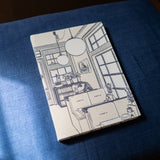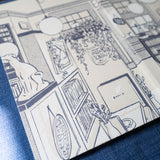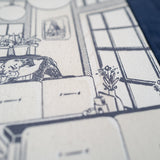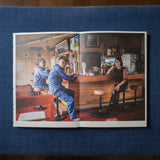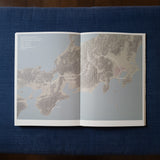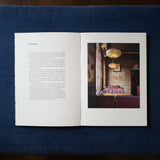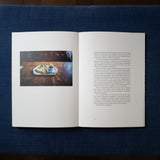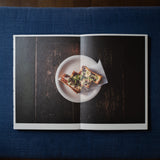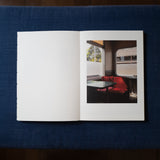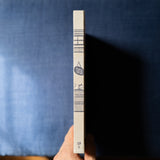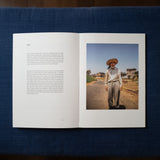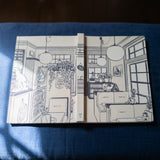Kissa by Kissa is a book about walking 1,000+km of the countryside of Japan along the ancient Nakasendō highway, the culture of pizza toast (pizza toast!), and mid-twentieth century Japanese cafés called kissaten.
Reader Testimonials
Hi — author Craig Mod here. I asked buyers of Kissa by Kissa to send in testimonials / thoughts about the book. Here are some of the (extremely!) kind things they wrote in with:
One of the most beautiful books I've seen and read in a long time. The physical nature of the book—and the text and photographs within—represent a thoughtful labor of love that one rarely sees in print these days.
This book made me want to make books.
More than just a book, it's an object, an artifact - and it is timeless. The thought that went into crafting this must be immerse. Thank you for putting so much into documenting a critical piece of fading culture.
I am so very glad I decided to buy Kissa by Kissa. I know I will return to this book again and again: to relish the beauty of the images; to be delighted and moved by the writing; to enjoy the craft of the object itself in my hands. Worth every penny.
Kissa by Kissa is one of the most beautiful books I've ever purchased. Craig takes us along his walk both visually through his writing and tangibly through the way he produced the book. I admire the thought that went into every aspect of experiencing this work.
This book is the most beautiful object I own, it might be too perfect. Books should be shared and Kissa by Kissa is compelling to share. All of my friends should get to wander Japan on a quest for pizza toast, but they don't get to. I don't trust them with book, the binding is perfect. You wouldn't lend out a Turner would you?
This is a gorgeous book! The subject matter is fascinating, and the book itself is a work of art.
Fifth Edition
Featured on this page is the 5th edition of Kissa by Kissa. The main difference from the 4th edition is an additional silk screen color on the cover (white). So now we have a two-color full-bleed wrap-around silk-screened illustration of one of my photographs of a kissa in Gifu. The illustration is by long-time collaborator and friend Luis Mendo.
Fourth Edition (2022): full-bleed silk screened cover (1,100 copies)
Third Edition (2021): "swiss" binding, significantly improved print resolution (1,000 copies)
Second Edition (2020): un-numbered / un-signed extension of first edition (1,200 copies)
First Edition (2020): numbered and signed edition (1,000 copies)
Making of Documentary
This is a documentary showing production of the third edition of the book:
Editions
Kissa by Kissa: How to Walk Japan (Book One)'s first edition (2020) of 1,000 copies sold out in two days (!) in August, 2020. The second edition (2020) sold out in about six months. The third edition (2021) was upgraded in a number of ways: from printing resolution (higher, stochastic halftone) to binding ("swiss"-style; layflat opening). This fourth edition takes the printing quality of the third edition and adds a new, wraparound silk-screened cover illustration.
Note: Although this is a limited run, the fourth edition is not signed or explicitly editioned (with a numbered stamp).
Production Notes
This fourth edition is (as you'd hope!) the most refined edition yet. Limited to 1,100 copies, like the third edition, this fourth edition is printed on top-tier Heidelberg presses at the famed Matsumoto-based Fujiwara Printing. The detail and "quality of light" in the photos looks and feels phenomenal.
This edition (like the third) is also hand bound, book by book, by the incredible Mochizuki Bindery in Kagurazaka, Tokyo. Because of our (annoyingly; sorry binder folks) precise specifications, the only way to reliably bind our book with a 1mm edge was by hand. The folks at Mochizuki produced two jigs specifically for this edition. The result is a flexibound hardcover, wrapped in cloth with a silk-screened cover.
Thanks to the work of Fujiwara Printing and Mochizuki binding, it's a true collectable.
About the Book
Kissa by Kissa is a book about walking 1,000+km of the countryside of Japan along the ancient Nakasendō highway, the culture of toast (toast!), and mid-twentieth century Japanese cafés called kissaten.
Details about the fourth edition (2021) physical object:
- limited to 1,100 copies
- cloth-bound, flexible hardcover (0.6mm boards)
- blue ink silk screened cover
- fine-art archival matte Japanese body papers (Araveal White, 110kg)
- 170mm x 240mm (~B5 size)
- 128 pages
- 19 essays / short stories
- 40 photographs
- printed and bound in Japan
The walk of this book begins in the city of Kamakura, just south of Tokyo. From there we head to Tokyo, and then from Tokyo all the way to Kyoto via the old Nakasendō highway, snaking through Saitama, over to Nagano, down through the bucolic Kiso Valley along the Kiso-ji road, into the plains of Gifu, alongside Lake Biwa, and to Kyoto. Along the way we meet farmers, gardeners, and a host of incredible and inspiring café owners.
Kissa by Kissa is not a guide.
You can think of it like a film. At a leisurely pace, Kissa by Kissa takes about ninety minutes to read. It’s designed to reward multiple readings and be a book you return to over time. It is linear, but doesn't need to be read linearly.
It sits somewhere between travelogue, photo book, and bizarro ethnographic field study of old café — kissaten — culture.
Those kissaten — or kissa — served up toast. I ate that toast. So. Much. Toast. Much of it pizza toast. If you buy this book, you'll learn more than you ever dared to know about this variety of toast available all across Japan. It's a classic post-war food staple. Kissa by kissa, and slice by thick slice of beautiful, white toast, I took a heckuva affecting and long walk. This book is my sharing with you, of that walk, the people I met along the way, and the food I ate.
To give you a sense of the distance covered, here's the spread in the book with the map of the walk:

Cover

Kissa by Kissa's cover illustration was drawn by the great Luis Mendo. The illustration is silkscreened onto the cloth using white and dark blue inks.
Production
From the box it ships in, to the thread the signatures are woven with, everything is made, assembled, and produced in Japan. This book was touched by — and helped employ — several dozen folks with sustainable and humane salaries, across a number of industries — from paper making, to box making, to printing and binding.
Thank you for your support and enabling us to do this kind of work in this way.
Contents
- Foreword
- Pachinko Road
- A Food for Children
- Kissa & Shōwa
- Interloping
- Ozu’s Geometry
- Pizza Toast & Būgen
- Thompson
- Alps
- Kiso-ji
- Sofa Chairs
- Shutter Towns
- Beniya
- Coffee Tickets
- City of Toast
- Canadian Coffee House
- Nagoya
- Ran
- Blood
- Kumata
- Map
- Photo Index
- Epilogue
- Interview with Sean McDonald
- Thanks
- Copyright & Colophon
About Craig

Craig Mod is a writer and photographer who has been based in Japan for the majority of the past twenty years. His book Koya Bound (2016) is an award winning (AIGA 50 Books / 50 Covers) book about the Kumano Kodo UNESCO pilgrimage path in Wakayama, Japan. Over the past seven years he's walked some 2,500km across the country and eaten several hundred slices of toast, pizza and plain alike. His writing has appeared in publications including The New York Times, Eater, The Atlantic, WIRED, The New Yorker, The Japan Times, California Sunday Magazine, and others. His weekly newsletters on walking, photography and writing are read by over 40,000 people.













